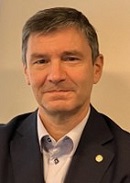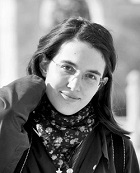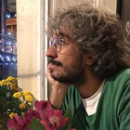Scientific committee

Prof. Alberto Credi
Vice Rector for Research and professor of general and inorganic chemistry at the University of Bologna
He is the founder and scientific director of the Center for Light Activated Nanostructures (CLAN), a joint laboratory between the University of Bologna and the Italian National Research Council for research in the areas of supramolecular chemistry and photochemistry, materials science and nanoscience.
His interests are focused on the development of molecular systems and materials controlled by light; in particular, his contribution to the realization of logic devices, machines and motors of nanometer size is internationally recognized.
He is involved in various research projects and he collaborates with several laboratories and institutes in Italy and abroad. He has authored five books and over 320 scientific publications, he received several awards, including an ERC Advanced Grant, and he has delivered more than 180 invited talks at national and international conferences and seminars. Since the beginning of his career, he has been engaged in the popularization of chemistry disciplines and scientific culture in general.

Prof. Francesca Masini
Delegate for Open Science and Research Data
Associate Professor of Linguistics at the University of Bologna. She studies how meaning is packaged into words and other constructions in the world’s languages, combining qualitative analysis with quantitative and experimental methods.
She is head of LILEC's Experimental Lab, a research environment that fosters the application of technology to linguistic data, and co-founder of Linguisticamente, the first Italian website for the popularization of language sciences.
As the Rector's Delegate for Open Science and Research Data, she promotes initiatives to make research outputs and knowledge more accessible, to support researchers on open science practices, and to foster the University of Bologna's participation in (inter)national networks.
She is co-chair of the Italian National Chapter of CoARA (Coalition for Advancing Research Assessment).

Prof. Stefano Diciotti
Department of Electrical, Electronic, and Information Engineering "Guglielmo Marconi"
Stefano Diciotti is an Associate Professor of Biomedical Engineering at the University of Bologna and Executive Scientific Coordinator of the "AI for Health and Well-being" area of the Alma Mater Research Institute for Human-Centered Artificial Intelligence. His main research fields are Computational Biomedical Imaging and Artificial Intelligence (AI) for Medicine with a particular interest in neurological and lung diseases to improve the understanding of pathophysiological mechanisms.
Stefano Diciotti is a Senior Member of the IEEE (Institute of Electrical and Electronics Engineers) and is affiliated with the IEEE Engineering in Medicine and Biology Society. Since 2016, he has been a contributor to the international ENIGMA-Ataxia meta-analysis working group initiative. He has co-authored over 120 scientific publications in international peer-reviewed journals. He is the principal investigator or head of a research unit of several projects funded by public and private entities. In particular, he is Spoke leader of the Spoke 2 (Intelligent health) of the PNRR project “Partenariato Esteso (PE) 6” – Precision Medicine – HEAL ITALIA “Health Extended Alliance for Innovative Therapies, Advanced Lab-research, and Integrated Approaches of Precision Medicine”. He is a member of the Editorial Board of Frontiers in Human Neuroscience, Frontiers in Bioengineering and Biotechnology, and the International Journal of Computer Assisted Radiology and Surgery.

Prof. Monica Forni
Department of Medical and Surgical Sciences
Monica Forni is Associate Professor of Veterinary Physiology at the University of Bologna and
Director of the Interdepartmental Centre for Industrial Research Health Sciences and Technologies, with long experience in preclinical and translational research. She is also interested in the quality assurance of teaching and research integrity and management, particularly in relation to the reproducibility.
Prof. Forni is member of the Italian Reproducibility Network and is the University of Bologna’s representative in EOSC (European Open Science Cloud) and ICDI (Italian Computing and Data Infrastructure). She has been member of the University’s Quality Assurance Committee and is “experts member” of ANVUR (National Agency for the Evaluation of Universities and Research Institutes) and of EAEVE (European Association of Establishments for Veterinary Education) with regard to teaching quality assurance. She is also a member of the Group of Evaluation Experts (GEV) in the VQR (National Research Quality Assessment of ANVUR) 2020-2024 and 2015-2019.
In 2021 Prof. Forni joined BBMRI.it (Biobanking and BioMolecular resources Research Infrastructure – Italy). Prof. Forni has a long-standing experience in managing R&D projects with leading roles in national and European funded projects within IMI and H2020 also related to skills and training of managers and operators of research (e.g. RItrainPlus, Skills4EOSC, European Laboratory Animals Experimental design Workin Group in education and training).

Prof. Silvio Peroni
Department of Classical Philology and Italian Studies
Director of Second Cycle Degree in Digital Humanities and Digital Knowledge
Silvio Peroni holds a PhD in Computer Science and is an Associate Professor at the Department of Classical Philology and Italian Studies, University of Bologna, where he teaches Computer Science and Open Science in several course. He is director of the International Second Cycle Degree in Digital Humanities and Digital Knowledge (DHDK) and of OpenCitations, an Open Science infrastructure dedicated to the publication of open bibliographic and citation data. His works concern theoretical studies and technical implementation of tools to foster semantic interoperability of Open Science services and infrastructures, and the development of systems to manage, integrate and query bibliographic information and cultural heritage data.